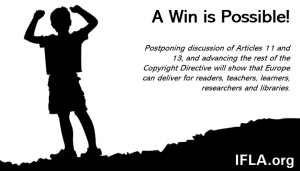In the last month, the European Commission has launched two flagship initiatives which look set to focus much of the attention of its President, Ursula von der Leyen, in the coming years.
Delivering on broader commitments, notably to the SDGs, they offer a more concrete and targeted response to two key trends – the growing role of digital technology in all parts of our lives, and climate change.
Each initiative – the European Green Deal and Shaping Europe’s Digital Future – includes a set of proposals and actions, aiming to place the region in a position of strength, while acting to safeguard lives, livelihoods, and values.
Given the role that these two documents are likely to have, it is worth already looking at what they mean for libraries, and where there may be value in pushing for more acknowledgement of the role that libraries can play in achieving their goals.
The European Green Deal
The first of the two documents to appear was the European Green Deal.
Ever since her nomination as President of the European Commission, Ursula von der Leyen has highlighted her commitment to action around climate change.
In this document, she sets out a path forward on this. As can be expected, this covers policy action in areas which are traditionally associated with climate change (emissions reduction, green energy, circular economy, energy efficiency, clean transport, environmentally-friendly food chains, protection of biodiversity and reducing pollution).
However, it also calls for sustainability to be mainstreamed into wider EU and national policies, and in turn for other priorities such as equality and growth are also integrated into climate action.
So what does this mean for libraries?
Already, the importance of information is recognised, both at the individual level in helping individuals take specific decisions between products, and at a continent-wide level in supporting research and data sharing. Libraries are a key part of the information infrastructure of any country, and so have a key role to play in success.
But there is also strong potential for libraries in references to the need for building awareness and motivation to act more broadly. Many libraries are already engaged in sustainability education, providing an excellent community space for building awareness of the need for change.
The Green Deal already refers to how schools and universities do this, but if we are to reach entire populations – for example to hold the citizen dialogues promised by the Green Deal, libraries must also be included.
Libraries are – furthermore – excellent candidates for efforts to promote renovation and refurbishment. As public spaces, they can act as models for communities of what is possible, building awareness more broadly.
Finally, it is to be hoped that as the implementation of the Green Deal moves forwards, there will be recognition of the role of culture and heritage in climate action. For more, see the work of the Climate Heritage Network, and IFLA’s own exploration of how libraries contribute to achieving the goals of the Paris Agreement.
Shaping Europe’s Digital Future
The second major policy document focuses on the different questions raised by the growing role of digital technology in our economies, societies and democracies.
While the previous Commission already saw scattered actions around particular aspects of digital – copyright and terrorist content for example – Shaping Europe’s Digital Future aims to set out a more comprehensive roadmap.
It does this by looking in turn at the individual level (ensuring that everyone has the connectivity and skills they need to make the best of the internet), markets (promoting competition, innovation and consumer rights) and civic life (freedom of speech, diversity of content, and the fight against crime).
The Agenda also underlines the international dimension, both in terms of setting rules and supporting digital development. While this remains to be defined, the whole Agenda is defined by a desire to find a European approach to the internet, and to maintain the possibility to enforce this.
What’s the library angle?
The most obvious is the strong focus on digital skills. With over seven million adults a year in Europe accessing the internet for the first time in libraries, and many more taking part in training activities, this is an area where libraries have a proven potential to contribute. The current consultation on the Digital Education Action Plan – one of the actions foreseen in document – offers an opportunity to highlight this point.
There are further opportunities however. The growing recognition that Europeans need high quality connectivity to the internet can start with libraries. Support through programmes such as WiFi4EU should not limit themselves to lower speed connections. In turn, this allows libraries to become hubs for small businesses, researchers and innovators.
The promise of further efforts to protect privacy and ensure individual rights online is also welcome, but it will be important to take care that such efforts do not in fact just reinforce the position of existing major players, or cause unintended harm to libraries and their users.
One way to ensure this is to use the potential of libraries to help empower people more broadly, not only through media literacy, but through raising awareness of everyone’s rights.
Clearly, these ideas should also form a pillar of the work the EU does in its neighbourhood and globally, ensuring that more people have libraries which can act as hubs for connectivity and skills, in line with the objectives of the agenda.
We are at an early stage in the current Commission’s term, but in these two areas, the potential for libraries to contribute – if properly engaged – is clear. We look forward to working further with the European authorities to make this happen.
 Discussions around the European Union’s draft Directive on copyright in the Digital Single Market are as tense as ever. Strong divisions have emerged between and among Member States and Members of the European Parliament around controversial proposals for a new press publishers’ right (Article 11) and an (effective) obligation on internet platforms to filter content (Article 13).
Discussions around the European Union’s draft Directive on copyright in the Digital Single Market are as tense as ever. Strong divisions have emerged between and among Member States and Members of the European Parliament around controversial proposals for a new press publishers’ right (Article 11) and an (effective) obligation on internet platforms to filter content (Article 13). The Good – Achievements So Far
The Good – Achievements So Far However, there are already complaints from some who had previously supported Articles 11 and 13, who are unwilling to accept anything less than the highly flawed original proposals.
However, there are already complaints from some who had previously supported Articles 11 and 13, who are unwilling to accept anything less than the highly flawed original proposals.